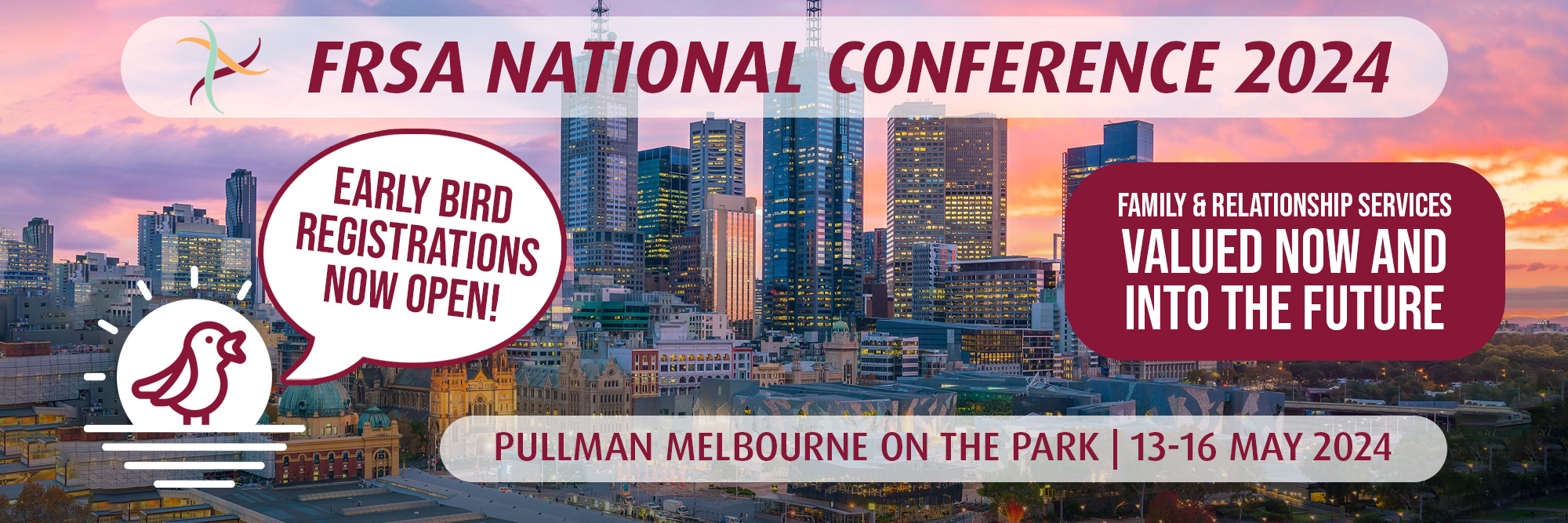
No. 16, 2023 | 1 December 2023
Go to:
From FRSA's Executive Director
I got home from work yesterday to find the kids had decided it was time to put the Christmas tree up! It was a stark reminder that Christmas is not that far away and I must concede my initial emotional reaction was filled more with ‘fear’ than joy given everything that needs to be done between now and then! A key focus for us in this last month of the year are the current reviews of the sector underway – the Families and Children Activity at DSS and the Review of the AGD Family Relationship Services Program. I just wanted to reinforce my message out to members last week that it is critically important that you engage with the Australian Institute of Family Studies’ (AIFS) processes of information gathering that are in the ‘marketplace’ at the present time. I appreciate time is far from optimum – but it is vital that members are involved. We are currently working on a written submission responding to the FRSP Review Terms of Reference and are also working on our response to Minister Leigh’s “Blueprint for NFP Reform” Discussion Paper – also due before the year is out.
Thanks to everybody for the great response to our call for abstracts process. These are currently under review but are happy to advise the early bird registrations for the National Conference are now open for 2024.
In September/October this year, a revised FRSA Constitution was approved by the FRSA Membership. A main driver behind the changes was to ensure the Constitution was fit for purpose in supporting the organisation to meet its objects and strategic endeavours. In doing so – there has been a bit of a shift in the makeup of the Board to reflect more contemporary Governance thinking regarding skills- based Boards.
The tenure of FRSA Board Directors is linked to the timing of the Annual General Meeting which was held, virtually, on Wednesday this week. The 2023 AGM was the last meeting for the outgoing Chair, Glenda Devlin; outgoing Treasurer, Serge Sardo who had reached their end of their tenure on the Board and co-opted Board members Judge Matthew Myers, AM; and Megan Mitchell also departing. It was reflected at the AGM that between them they had contributed over 23 years to FRSA during their time on the Board. The commitment and dedication Glenda, Serge, Matt and Megan gave to the life and times of FRSA was acknowledged by their Board peers and I too am extremely grateful to each of them for their leadership, guidance and collaboration.
At the FRSA AGM the newly appointed Board Directors who will take up a three year appointment were announced and welcomed to the FRSA Board:
- Judge Alexandra (Alex) Harland, Judge, Federal Circuit and Family Court of Australia | Division 2
- Ms Cheryl Orr, Principal Solicitor, Cheryl Orr Family Law
- Ms Felicity Williams, Chief Executive Officer, Upper Murray Family Care
Continuing on the Board will be:
- Fallon Roberts, Executive Manager, Centacare NENW
- Teresa Jayet, Chief Executive Officer, Mallee Family Care
- Zoe Locke, Deputy Director, CatholicCare Social Services
- Leanne Strommen, General Manager, Centrecare Inc
- Allison Wainwright, Chief Executive Officer, Family Life
Teresa Jayet was appointed as the new Chair of FRSA; Allison Wainwright as Deputy Chair and Zoe Locke as Treasurer. Allison Wainwright will continue to lead the Board Research and Policy Committee; Leanne Strommen the Sector Events Committee and Zoe Locke steps into the role of Chair of the Finance, Risk and Governance Committee. There is one remaining position to be filled with the intention that the recruitment process will be finalised early in the New Year.
You can find out more about the FRSA Board and the Governance structure on the FRSA Website.
I note that 25 November marked the International Day for the Elimination of Violence against Women on which the UNiTE campaign was launched – an initiative of 16 days of activism against gender-based violence around the world.
International Day of People with Disability will be held on 3 December. The United Nations theme for IDPwD 2023 is United in action to rescue and achieve the Sustainable Development Goals (SDGs) for, with and by persons with disabilities.
Kind regards,
Jackie Brady
FRSA Executive Director
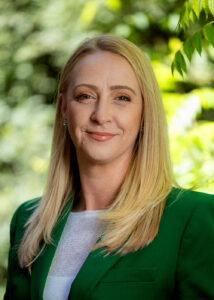
FRSA National Conference 2024 - EARLY BIRD REGISTRATIONS OPEN!
Don’t miss out on early bird registration rates, which end 4 March 2024. As the sector’s ‘go to’ National, annual event – FRSA will not fail to deliver great speakers, great sessions, great networking and a great venue.
Early Bird Registration Fee* Until 4 March 2024
| Member Rates | Non-Member Rates | |
| Complete Conference Experience – Including dinner | $1,095.00 | $1,395.00 |
| Conference Only – No dinner | $1,020.00 | $1,320.00 |
* To be entitled to the early bird registration fee you must have registered and paid by 15 March 2023.
Pre-Conference Workshops – FRSA MEMBERS ONLY
| Member Rates | |
| Dadirri – Ancient Aboriginal Mindfulness Traditions (Aboriginal & Torres Strait Islander Workshop) |
$175.00 |
| Family Law Workshop (All Day) | $175.00 |
| LGBTIQA+ Family Practice Workshop Presented by Drummond Street Services |
$175.00 |
| Using evidence to paint a picture: Finding opportunities for learning, growth and sharing the success of child and family services Presented by the Australian Institute of Family Studies |
$175.00 |
Bursary Program Applications now open
FRSA is pleased to announce that two bursaries are available for Aboriginal and Torres Strait Islander people who are registered for or would like to attend the 2024 Family & Relationship Services Australia National Conference,
Bursaries are provided to assist with covering the cost of conference registration, and travel & accommodation. Each package includes:
- 1 x Complimentary full registration to the Conference (including dinner)
- $500 towards travel and accommodation
To be eligible you must be an employee of a fully financial FRSA member organisation. Applications closes on THURSDAY, 28 March 2024.

FRSA Annual Report 2022-23 launched
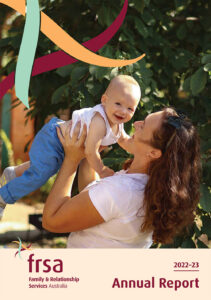 FRSA’s Annual Report for 2022-23 was launched at the Annual General Meeting on Wednesday 29 November 2023 by FRSA Board Chair, Glenda Devlin.
FRSA’s Annual Report for 2022-23 was launched at the Annual General Meeting on Wednesday 29 November 2023 by FRSA Board Chair, Glenda Devlin.
Under our new constitutional arrangements, we were able to hold the AGM online for the first time. While we always value the opportunity to meet face to face, holding the AGM online did enable more people to attend.
FRSA’s annual reports provide an overview of FRSA’s activities during each 12 month period (July-June). This includes program activity and evaluation, policy and advocacy, research, events and the financial report for that period.
Recent FRSA submissions to government consultations
Over October-November, FRSA made three submission to government consultations. All submissions are published on our website.
A stronger, more diverse and independent community sector – DSS Consultation
As part of the Australian Government’s election commitment for a stronger, more diverse and independent community sector, the Department of Social Services is exploring opportunities to better support Australian communities through the design and administration of grants to the sector, including more meaningful working partnerships and options for greater innovation. Read FRSA’s submission.
Family Law Amendment Bill (No. 2) 2023: Exposure draft – Attorney-General’s Department Consultation
In late September 2023, the Attorney-General’s Department released a second round of proposed amendments to the Family Law Act, which seek to improve the family law system so that it is accessible, safer and simpler to use. Parliament passed the first tranche of legislative amendments on 19 October. Read FRSA’s submission.
National Legal Assistance Partnership (NLAP) Review
The NLAP is being reviewed by an Independent Reviewer, Dr Warren Munday. NLAP is a national partnership agreement between the Australian Government and states and territories for funded legal assistance. Read FRSA’s submission.
ABS Personal Safety Survey
The Australian Bureau of Statistics (ABS) recently released information from the 2021-22 Personal Safety Survey, which outlines disturbing statistics on partner violence and child abuse.
An estimated 4.2 million Australian adults (21 per cent or one in five) have experienced violence, emotional abuse or economic abuse by a partner. Women were more likely than men to have experienced violence, emotional abuse, or economic abuse by a partner since the age of 15. The survey found that financial stress was associated with experiencing partner violence and abuse for women.
An estimated 2.7 million Australians aged 18 years and over (14 percent or one in seven) have experienced childhood abuse.
Women were more likely to have experienced sexual abuse (11 per cent) than physical abuse (10 per cent) during their childhood, whereas men were more likely to have experienced physical abuse (8.3 per cent) than sexual abuse (3.6 per cent).
Most people who experienced childhood abuse knew the perpetrator. The survey found that 1.9 million people (10 per cent) experienced childhood abuse by an adult family member, while nearly 380,000 (2 per cent) experienced abuse by an adult within an institutional setting.
People who experienced childhood abuse were more than three times as likely to experience partner violence as an adult. The survey also found that people who witnessed parental violence during childhood were more than twice as likely to experience partner violence as an adult (25 per cent) compared with those who did not witness parental violence during childhood (9.3 per cent).
Australian National Research Agenda to End Violence against Women and Children
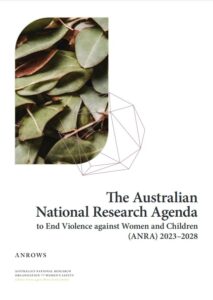 ANROWS has launched the Australian National Research Agenda (ANRA) for 2023-2028. Developed in collaboration with dedicated stakeholders, researchers, frontline practitioners, and victims and survivors, the ANRA serves as a national framework that will guide collective efforts over the next five years.
ANROWS has launched the Australian National Research Agenda (ANRA) for 2023-2028. Developed in collaboration with dedicated stakeholders, researchers, frontline practitioners, and victims and survivors, the ANRA serves as a national framework that will guide collective efforts over the next five years.
The ANRA identifies what evidence is needed to end domestic, family and sexual violence and how that evidence should be produced. The framework can be used by the community of committed people and organisations who are working to grow the evidence base: researchers, funders, policymakers, services, survivor advocates and social impact organisations.
There are nine research priorities across three topics:
- Systems and Society
- Structural inequities
- Gender relations, gender norms and attitudes
- Trauma and DFSV-informed, victim-centred systems
- Populations in Focus
- Aboriginal and Torres Strait Islander peoples
- Children and young people
- People who use domestic, family and sexual violence
- Type and Patterns of Violence
- Sexual violence
- Coercive control
- Economic abuse.
Building Access End of Project Report
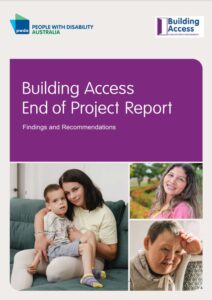 People with Disability Australia has released the Building Access End Of Project Report. The Building Access project was an innovative initiative enabling domestic and family violence (DFV) services to better meet the needs of women and children with disability.
People with Disability Australia has released the Building Access End Of Project Report. The Building Access project was an innovative initiative enabling domestic and family violence (DFV) services to better meet the needs of women and children with disability.
The key findings of the report revealed that of the women with disability interviewed:
- 100 per cent have experienced fear and mistrust of services and authorities.
- 71 per cent would avoid reporting incidents of DFSV to police in the future.
- 57 per cent avoided seeking support due to negative past experiences including dismissal, discrimination and experiencing further harm.
- 28 per cent reported fear of having children removed from their care if they accessed services.
The report indicates that inclusive policies and practices produce better outcomes for women with disability (WWD), both as staff and clients, of DFV services. These policies and practices, along with accessibility audits and disability awareness training create an environment of attitudinal accessibility. This means notable and meaningful organisational change with accessibility integrated into their organisational structure, planning and delivery, and WWD experiencing violence getting the support they need. Read the full report.
SNAICC Family Matters 2023 Report Launched
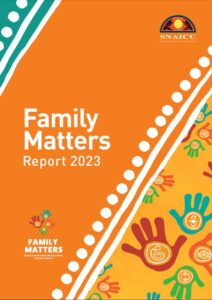 On 29 November, SNAICC launched its Family Matters 2023 Report.
On 29 November, SNAICC launched its Family Matters 2023 Report.
The annual Family Matters Report examines government actions to address the over-representation and the outcomes for Aboriginal and Torres Strait Islander children in child protection systems. It highlights Aboriginal and Torres Strait Islander-led solutions and calls on governments to support and invest in the strengths of Aboriginal and Torres Strait Islander peoples to lead on child wellbeing, development and safety responses for Aboriginal and Torres Strait Islander children.
Key findings:
- 22,328 Aboriginal and Torres Strait Islander children currently in out-of-home care
- 10.5 times more likely to be living in out-of-home care than non-Indigenous children
- Aboriginal and Torres Strait Islander children represent 42.8% of the total number of children in out-of-home care but only represent 5.98% of all children in Australia.
Concerningly, the current trends suggest that the National Agreement on Closing the Gap’s Target 12 (to reduce the over-representation of Aboriginal and Torres Strait Islander children in out-of-home care by 45% by 2031) will not be met. SNAICC has said that the most effective and immediate action the government can make to ensure the safety and protection of First Nations children is to stand up a National Aboriginal and Torres Strait Islander Children’s Commissioner, with the legislated power to investigate and make recommendations on issues impacting First Nations children.
Mission Australia's Youth Survey 2023 report
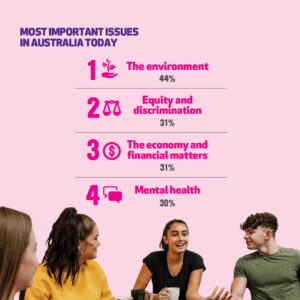 Mission Australia has released their Youth Survey 2023 report. This year, more than 19,500 young people were surveyed for the 23rd annual Youth Survey between March and August 2023.
Mission Australia has released their Youth Survey 2023 report. This year, more than 19,500 young people were surveyed for the 23rd annual Youth Survey between March and August 2023.
This year’s report reveals the environment (44%), equity and discrimination (31%), the economy and financial matters (31%) and mental health (30%) topped the issues young people aged 15-19 considered most important in Australia. There were greater levels of concern among young people about issues relating to housing and homelessness this year (19%, up from 12% in 2022).
Mission Australia CEO Sharon Callister said the research showed young people were engaged with major environmental, political and societal issues facing the country.
“Responses were given amidst Australia’s severe weather disasters as well as public discussion and advocacy on climate change, mental health, the Voice Referendum and racism, the rising cost of living and the housing and homelessness crisis,” she said. Read more.
Barriers to work – ABS data released
The ABS has just released data on barriers and incentives to Labour Force Participation in Australia for 2022-23.
Long-term health conditions or disability was the largest barrier to participation in the labour market for people out of work or wanting more hours, but only slightly ahead of caring for children.
The latest figures give insights into the barriers for around 2 million people who did not work full-time and who either wanted a job (1.3 million people) or were working part-time and wanted more working hours (730,000 people).
In 2022-23:
- The most common reason women were unavailable to start a job or work more hours within four weeks was ‘Caring for children’, while for men it was ‘Long-term sickness or disability’.
- The most important incentives for people to seek a job or more hours were the ‘ability to work part-time hours’ and ‘finding a job that matches skills and experience.’
Navigating Turbulence – survey of single mothers
The Council of Single Mothers and their Children (CSMC) has launched a report – Navigating Turbulence – with the findings of a survey of single mothers.
The report surveyed 1168 single mums from around Australia on questions about housing, income levels, employment status, education, family violence, family law, and the impacts of COVID.
Key findings include:
- 87% of single mothers are concerned about their long-term financial circumstances
- 56% of respondents are currently living below the poverty line, with the rate increasing according to the number of children in their care
- Safe and affordable housing was a main concern for survey respondents, with nearly half (49 per cent) not feeling confident about their long-term housing
- 67% of single mothers have experienced family violence, increasing to 75 per cent in families with a mother and/or child who are living with a disability.
A full report and a condensed version of the report are available on the CSMC website.

FRSP Review – submissions welcomed
The new lead of the review of the Family Relationship Services Program (FRSP), Mr Andrew Metcalfe AO, welcomes submissions from all interested stakeholders.
The FRSP is funded by the Attorney-General’s Department and offers a suite of family law services aimed to improve the wellbeing of Australian families who are at risk of separation or who have separated. The review of FRSP has been commissioned by the Attorney-General’s Department, with the Australian Institute of Family Studies (AIFS) undertaking research to support the review. AIFS currently has a survey of family law professionals in the field, which will close on 1 January 2024.
Submissions to the review are due by 18 December 2023 and can be emailed to FRSPLeadReviewer@aifs.gov.au
Not-for-Profit Sector Development Blueprint – Consultation
On 1 November, the Albanese Government released an Issues Paper – the Not-for-Profit Sector Development Blueprint. The Blueprint will be used to develop a suite of sector-led workable and effective options for reform to strengthen social capital and a vibrant sector.
More information about the consultation can be found on the DSS Engage website. Submissions close 20 December.
Ministerial Forum on Child Safety
A Ministerial Forum on Child Safety was held on 24 November 2023 bringing together Commonwealth, state and territory ministers to discuss national reforms to prevent child sexual abuse in Australia.
Participants in the Forum reaffirmed existing child safety reforms, emphasising the need to ensure national consistency to protect Australia’s children.
This included:
- prioritising working with children check harmonisations
- ensuring this work complements broader worker screening reforms
- renewed commitment to embedding the National Principles for Child Safe Organisations in legislation
- options to enhance sharing child safety and wellbeing information across sectors and jurisdictions.
Participants also agreed to further consider options to improve child safety through enhancing monitoring of working with children checks, raising awareness and understanding of child safety issues, and alignment of jurisdictional reportable conduct schemes.
The Forum was chaired by Attorney-General the Hon Mark Dreyfus KC MP.
Draft report on philanthropic giving released
Today the Productivity Commission released the draft report of its review of philanthropic giving in Australia. The goal of the review is to boost donations to charities and meet the Australian Government’s goal of doubling philanthropic giving by 2030.
The draft report explores the future foundations for giving, focusing on three pillars of reform:
- tax deductible gifts and donations
- the regulatory system
- public information on charities and giving.
Submissions on the draft report will be open until 9 February 2024. The final report will be provided to the government in the first half of 2024.
The draft report and information about the review are available here.
Women and Women’s Safety Ministerial Council
The Women and Women’s Safety Ministerial Council met virtually on 24 November 2023.
Minister Rishworth provided an update on women’s safety matters, including the Department of Education’s work under the Universities Accord reforms. Assistant Minister Elliot provided an update on the Online Harms Ministers Meeting.
All states and territories shared high-level updates with the Council on the work underway in their jurisdictions to advance gender equality and address violence against women and children.
You can read the Women and Women’s Safety Ministerial Council communique here.
Select Committee on Cost of Living – submissions still open
The submission closing date to the Parliamentary Inquiry on Cost of Living has been extended to 28 March 2024. The committee is particularly interested to hear about solutions that address cost of living pressures, and is encouraging both new submissions as well as supplementary submissions from those who have previously submitted to the inquiry.
The committee is due to report by 31 May 2024. Information about the inquiry is on the committee’s webpage.
Improving reporting on imitate partner homicide
On 25 November the Albanese Government announced the implementation of a new statistical dashboard which will provide more timely reporting on intimate partner homicide.
The new dashboard will be released by mid-2024 and will be managed by the Australian Institute of Criminology. The dashboard will enable police, governments, policy makers and all those who are working to end violence against women and children, to better understand what is happening and when.

Relationships Australia celebrates 75 years!
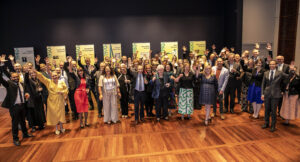
FRSA Executive Director, Jackie Brady, and Manager of Policy & Research, Robyn Clough were delighted to join the celebration of Relationships Australia 75th anniversary at the National Gallery in Canberra on 14 November.
The event was attended by Relationships Australia members, past and present, from across the federation as well as Ministers, stakeholders, and other dignitaries.
Guests were able to explore a curated exhibition of the history and journey of Relationships Australia as well as hear from guest speakers. It was a great line up of speakers, each bringing different insights to the evolution of Relationships Australia and to the themes of connection, families and relationships in Australia:
- Professor Lyn Littlefield OAM, Chair of the National Council of Relationships Australia
- Hon Dr Andrew Leigh MP, Assistant Minister for Competition, Charities and Treasury, and the Assistant Minister for Employment
- The Hon. Amanda Rishworth, MP, Minister for Social Services
- Sarah Decrea, Aboriginal Families Practice Leader at Relationships Australia South Australia.
The evening was both reflective and forward looking. In the words of Nick Tebbey, National Executive Officer for Relationships Australia, “Today we not only pay homage to our past and acknowledge our present but also reaffirm our commitment to expanding support in the future. Our vision is one where every member of the community can access transformative support services that empower them to overcome relationship difficulties and lead fulfilling lives.”

Social Enterprise Development Initiative Grants Administrator
The Social Enterprise Development Initiative Grants Administrator funding opportunity is being provided by the Department of Social Services.
The Australian Government is inviting applications through an open grant process to apply to deliver services under the Social Impact Investing Program – Social Enterprise Development Initiative (SEDI) from March 2024 to 30 June 2026. SEDI will run over 3 years from 2023–24 to 2025–26.
SEDI will engage a Grants Administrator to provide capability building grants of up to $120,000 (GST exclusive) to eligible social enterprises. The grants will be targeted towards supporting social enterprises to be more effective and efficient in demonstrating and increasing social impact for the vulnerable individuals and communities they exist to support.
The SEDI Grants Administrator must work with the department to design the capability building grant administration process to ensure that grants are awarded to eligible recipients through a robust selection process that meets Commonwealth requirements.
Applications are now open and close 5pm AEDT on Wednesday 6 December 2023. Click here to find out more.
AIFS 24 Conference - Registrations are now open!
Registrations are now open for the Australian Institute of Family Studies 2024 Conference – Families Thriving? Asking Big Questions. Influencing Change.
The conference will be held 11-14 July 2024 at the Melbourne Convention and Exhibition Centre.
You can register or find out more about the conference here.
AIFS Needs & Impact Survey: For the child and family sector
 If you use any Australian Institute of Family Studies'(AIFS) practice or evaluation resources in your work with the community, they want to hear from you.
If you use any Australian Institute of Family Studies'(AIFS) practice or evaluation resources in your work with the community, they want to hear from you.
The aim of the survey is to learn about the issues you’re facing, how AIFS can support your use of evidence in your work, and the best way to provide resources to you. It asks about the work you do, how you use their resources, and what you’d like to see in future resources.
Click here to complete the survey, it will take around 10-15 minutes to complete. This survey will close on Monday 15 December 2023.
Effective Online Group Leadership Workshop
SUNSHINE CIRCLES – Albury
SUNSHINE CIRCLES – Shepparton
NT
Counsellor | Anglicare NT
NSW
First Nations Youth Access Worker – headspace Wagga Wagga | Relationships Australia Canberra & Region
Portfolio Manager | CatholicCare Wilcannia-Forbes
QLD
Family Dispute Resolution Practitioner | UnitingCare Community
If you have any events you’d like listed on the FRSA Events and Training Calendar or job vacancies you’d like listed on the FRSA Jobs Board, email Communications Officer, Vanessa Lam at communications@frsa.org.au. Please note that posting onto the FRSA website is reserved for FRSA Members only.

Sexual exploitation in Australia: victim-survivor support needs and barriers to support provision | Australian Institute of Criminology
 This report provides a valuable resource to help policy-makers and practitioners to support, improve, evaluate and fund specialised services, and to anticipate the needs of sexual exploitation victim-survivors.
This report provides a valuable resource to help policy-makers and practitioners to support, improve, evaluate and fund specialised services, and to anticipate the needs of sexual exploitation victim-survivors.
This research establishes a knowledge base regarding the role of victim and survivor advocates in developing public policy and best practice mechanisms for engagement. Findings provide insights for practitioners regarding the effective engagement of victims and survivors in the development of gender-based violence policy, particularly ensuring often-marginalised voices are heard.
Workplace Equality and Respect | OurWatch
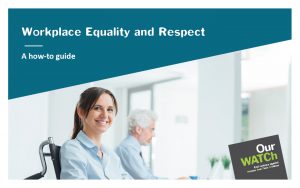 This website is for people doing violence prevention work in their workplace. It includes information to help you assess and identify key actions to ensure that gender equality and respect are at the centre of your business or organisation. There are also tools and resources to support you along the way.
This website is for people doing violence prevention work in their workplace. It includes information to help you assess and identify key actions to ensure that gender equality and respect are at the centre of your business or organisation. There are also tools and resources to support you along the way.
Everyone’s business: research into responses to the abuse of older people (elder abuse) in Western Australia | Edith Cowan University
 Many older Australians experience abuse, neglect or financial exploitation, usually at the hands of their adult children or other close relatives. This research report reveals the key reasons older people experiencing harm do not receive the support they so desperately need.
Many older Australians experience abuse, neglect or financial exploitation, usually at the hands of their adult children or other close relatives. This research report reveals the key reasons older people experiencing harm do not receive the support they so desperately need.
Engaging young children (0-5) in nature play | Australian Institute of Family Studies
Nature play is child led, unstructured and provides a range of benefits to a child’s development (including physical, social and emotional opportunities for development).
Practitioners can support parents and children to engage in nature play, find out more in the latest practice guide.
Identifying and understanding child sexual offending behaviours and attitudes among Australian men | Michael Salter, Delanie Woodlock, Tyson Whitten

This project aimed to inform efforts to better detect and prevent child sexual abuse through a rigorous analysis of the prevalence and attitudinal, behavioural and demographic correlates of sexual feelings and/or offending against children amongst Australian men.
Connection and belonging | Emerging Minds
Emerging Minds Families has released the first topic in a new series that has been created by families with lived experience of getting through tough times. Focused on connection and belonging, this topic aims to spark hope and new ideas for finding and sustaining a sense of belonging for parents and their children. These resources include skills for parents to build connection with and beyond their own families, and tips for those who may be struggling to parent. Along with these you will find a practitioner guide for using these resources in your work with parents and families.
Overcoming Resistance and Backlash | Safe + Equal
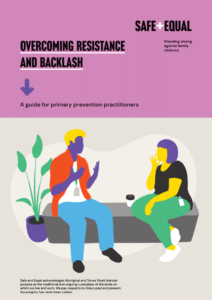 This resource brings together and adds to existing resources by providing tips on effective strategies and ways of overcoming resistance, and other more extreme forms of backlash.
This resource brings together and adds to existing resources by providing tips on effective strategies and ways of overcoming resistance, and other more extreme forms of backlash.
Want to submit something to the FRSA eBulletin?
If you have an news item or event that you would like to be featured in a future eBulletin please submit your announcement via the form below or email communications@frsa.org.au with the subject “FRSA eBulletin submission”.
Please note FRSA members receive priority for items posted in the eBulletin. And to keep information current, relevant and useful, submissions will not be repeated from week to week.
Subscribe
Subscribe to receive future eBulletin editions directly to your inbox!





